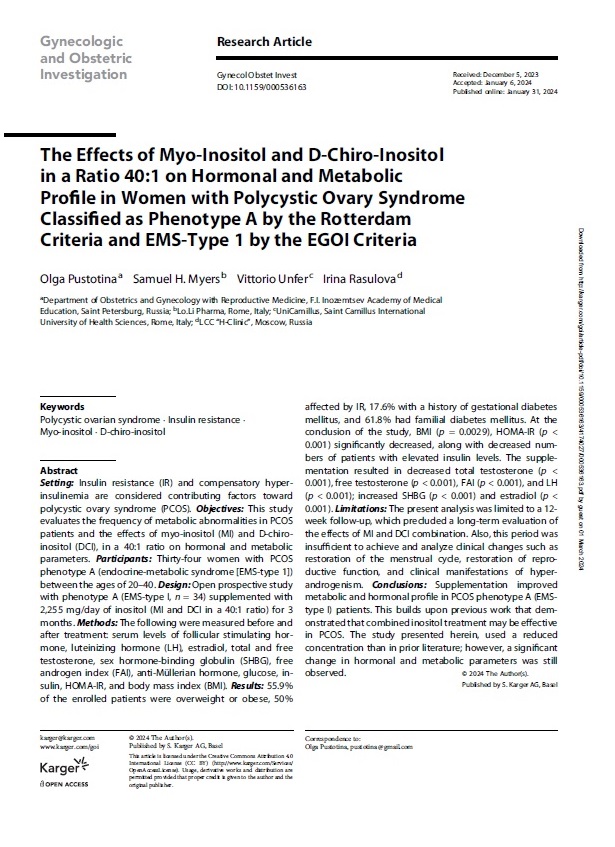Authors:
Olga Pustotina, Samuel H. Myers, Vittorio Unfer, Irina Rasulova
Setting: Insulin resistance (IR) and compensatory hyperinsulinemia are considered contributing factors towards polycystic ovary syndrome (PCOS).
Objectives: This study evaluates the frequency of metabolic abnormalities in PCOS patients and the effects of myo-inositol (MI) and D-chiro-inositol (DCI), in a 40:1 ratio on hormonal and metabolic parameters.
Participants: 34 women with PCOS phenotype A (EMS-type 1) between the ages of 20-40.
Design: Open prospective study with phenotype A (EMS-type I, n=34) supplemented with 2255 mg/day of inositol (MI and DCI in a 40:1 ratio) for 3 months.
Methods: The following were measured before and after treatment: serum levels of follicular stimulating hormone (FSH), luteinizing hormone (LH), estradiol, total and free testosterone, sex hormone-binding globulin (SHBG), free androgen index (FAI), anti-Müllerian hormone (AMH), glucose, insulin, HOMA-IR, and body mass index (BMI).
Results: 55.9% of the enrolled patients were overweight or obese, 50% affected by IR, 17.6% with a history of gestational diabetes mellitus, and 61.8% had familial diabetes mellitus. At the conclusion of the study, BMI (p=0.0029), HOMA-IR (p<0.001) significantly decreased, along with decreased numbers of patients with elevated insulin levels. The supplementation resulted in decreased total testosterone (р<0.001), free testosterone (р<0.001), FAI (р<0.001) and LH (р<0.001); increased SHBG (р<0.001) and estradiol (р<0.001).
Limitations: The present analysis was limited to a 12-week follow-up, which precluded a long-term evaluation of the effects of MI and DCI combination. Also, this period was insufficient to achieve and analyze clinical changes such as restoration of the menstrual cycle, restoration of reproductive function, and clinical manifestations of hyperandrogenism. Conclusions Supplementation improved metabolic and hormonal profile in PCOS phenotype A (EMS-type I) patients. This builds upon previous work that demonstrated that combined inositol treatment may be effective in PCOS. The study presented herein, used a reduced concentration than in prior literature; however, a significant change in hormonal and metabolic parameters was still observed.

